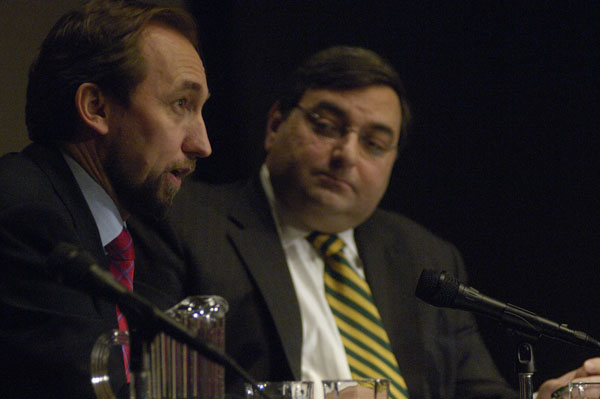Diplomats Discuss Iraq's Future
March 28, 2007
Diplomats Discuss Iraq's Future

Prince Zeid Ra?ad Zeid Al-Hussein (left) and Ambassador Feisal Al-Istrabadi
Watch "Iraq: Rebuilding a Nation's Health"
Part 1 | Part 2 | Part 3
Diplomats from Iraq and Jordan who spoke at a March 22 symposium at the Johns Hopkins Bloomberg School of Public Health stressed that a ?soft partition? of Iraq could lead to sectarian cleansing and an escalation of ethnic conflicts that would likely?destroy any chances of building a stable democracy.
Under partition, a strategy that has been sharply criticized by?U.S. officials and Iraq?s neighbors, three or four independent provinces would be established and the country?s numerous ethnic and religious groups would be relocated.
At the symposium, ?Iraq: Rebuilding a Nation?s Health,? Ambassador Feisal Al-Istrabadi, Iraq?s Deputy Permanent member to the United Nations, predicted that partitioning would divide Iraq into ?eight warring fiefdoms? and plunge the country even deeper into chaos.
Despite widespread violence among ethnic and religious factions and against the new Shiite-led government, Al-Istrabadi said that ordinary Iraqis have lived together for thousands of years in a mosaic of cultures and faiths and do not support a forced division into separate regions.
?I?d like to place an emphasis on the necessity to think about Iraq from an Iraqi context and within an Iraqi context,? he said. ?We have our own intramural communal relationships built up over millennia. Too often, policy makers and politicians outside of Iraq treat us as if we were lines drawn on a map which can be redrawn with the same ease that one may make a line on any other piece of paper.?
?Let?s call ethnic cleansing what it is,? he said.
Prince Zeid Ra?ad Zeid Al-Hussein, Jordan?s Ambassador to the U.S., said that discussion of a partition option is largely limited to Washington ?think tanks.? But in?his conversations with?U.S. legislators,?Al-Hussein said they?have?made?it?clear?that?they?are?under pressure from their constituents to ?disengage? from Iraq.
?One lawmaker said to me, ?We are not statesmen, we are politicians who want to be reelected. The attitude is, ?We have put enough money in, we have led enough and you have to deal with it.?? he said.???
As the discussion came to a close with a question and answer session, one questioner who identified himself as a physician, leveled sharp criticism against the Iraqi government, citing the arrest of a top health ministry official for membership in a government-backed Shiite death squad. He also expressed anger that four Sunnis convicted with Saddam Hussein were hanged, while three convicted Shiites were not.
?There is a perception among Arabs and Iraq Sunnis that this is a very sectarian government and a government that is protecting death squad members, killers and thugs,? he asserted.
Al-Istrabadi was visibly angered by the charge: ?Are you really suggesting that in doing justice, perception is more important than reality? As a doctor, are you willing to state that the perception of a cure is better than a cure? If you?re willing to state that, then I?ll state that the perception of justice is better than justice.?
The Iraqi diplomat continued: ?The question isn?t did we hang a Shiite or a Sunni. The question you should be asking is, ?Did we hang a thug, did we hang a murderer?????
Al-Istrabadi acknowledged that the Iraqi government has much work ahead to achieve stability, but for those who suffered under the rule of a despot, its existence is a reason for optimism. ?We have established a principle of democracy in Iraq,? he said. ?It is by no means perfect yet, but democracy is a process, not an endpoint.?--Jackie Powder
